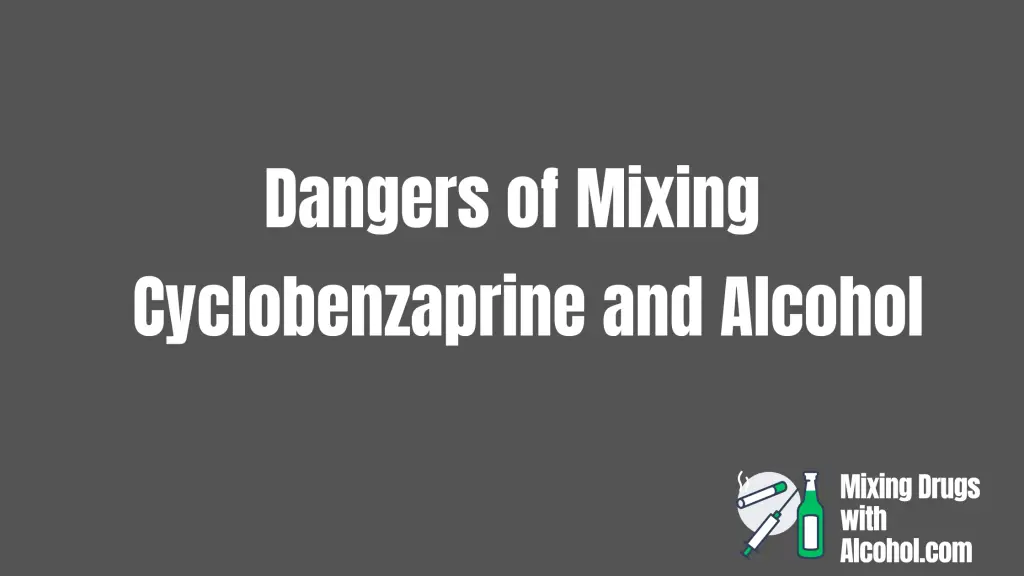Combining cyclobenzaprine and alcohol can be dangerous, as both substances can interact in unpredictable ways. Cyclobenzaprine is a muscle relaxant used to treat muscle pain, while alcohol is a depressant that slows down the central nervous system.
Mixing them can cause adverse effects such as confusion, drowsiness, and difficulty breathing. Before combining these two substances, it’s important to be aware of possible interactions with other medications, which could increase the risk of serious health complications.
What Is Cyclobenzaprine ?
Cyclobenzaprine blocks nerve signals to treat muscle spasms. Mixing it with alcohol can be dangerous due to their combined depressant effects on the central nervous system, increasing the risk of sedation, drowsiness, reduced mental clarity, respiratory depression, and overdose.
Cyclobenzaprine Interactions with Alcohol
Is it Safe to Take Cyclobenzaprine With Alcohol?
No, it is not safe to take cyclobenzaprine with alcohol. Cyclobenzaprine is a muscle relaxant used to relieve muscle spasms and it works by affecting the central nervous system.
Alcohol is also a central nervous system depressant, which means that it slows down brain activity and can affect your ability to think, speak, and move.
Side-Effects of Taking Cyclobenzaprine And Alcohol
Cyclobenzaprine is a muscle relaxant used to relieve muscle spasms and pain. Alcohol is a depressant that can cause drowsiness and impair motor function.
Mixing cyclobenzaprine with alcohol can have harmful effects, including short-term and long-term side effects. Here are some of the potential side effects of taking cyclobenzaprine and alcohol together:
Short-term side effects:
- Increased drowsiness
- Impaired motor function
- Dizziness or lightheadedness
- Nausea and vomiting
- Slurred speech
- Impaired judgment
- Increased risk of accidents, falls, and injuries
Long-term side effects:
- Increased risk of liver damage
- Increased risk of cardiovascular problems
- Increased risk of addiction or substance abuse
- Increased risk of depression and anxiety
- Increased risk of cognitive impairment and memory loss
- Increased risk of digestive problems and gastrointestinal bleeding
It is important to avoid drinking alcohol while taking cyclobenzaprine, and to follow your doctor’s instructions for dosing and monitoring your symptoms.
Mixing these substances can be dangerous and increase the risk of side effects. Always talk to your doctor about any concerns you have about your medications, and never mix prescription drugs with alcohol without medical supervision.
How To Take Medication Safely
Take caution when mixing cyclobenzaprine and alcohol. The interaction between these two substances is not well-studied, and can cause drowsiness, impaired judgment, and other effects.
It’s important to speak with a doctor or pharmacist before combining any medication with alcohol to ensure safe dosing and avoid potential side effects. Always read medication labels for warnings and precautions.
Taking Cyclobenzaprine And Other Drugs
Cyclobenzaprine is a muscle relaxant used by 6 million Americans for muscle spasms. Understanding its interactions with other drugs, including alcohol, is crucial.
Combining it with other drugs like NSAIDs, anticonvulsants, MAOIs, TCAs, and opioids can also cause adverse reactions.
Cyclobenzaprine And Caffeine Interaction
The interaction between cyclobenzaprine and caffeine can be unpredictable and potentially dangerous. Cyclobenzaprine is an antidepressant used to treat muscle spasms, while caffeine is a stimulant that increases alertness and reduces fatigue.
When taken together, side effects like drowsiness, dizziness, and increased heart rate can occur. Avoid mixing these drugs with alcohol.
Frequently Asked Questions About Danger of Mixing Cyclobenzaprine and Alcohol:
It is not recommended to drink alcohol while taking cyclobenzaprine as it can increase the side effects of dizziness, drowsiness, and difficulty concentrating.
It is not recommended to take cyclobenzaprine with wine or any other alcohol as it can increase the risk of side effects such as dizziness and drowsiness.
Alcohol can enhance the effects of muscle relaxers, leading to increased dizziness, drowsiness, and difficulty concentrating. This can be dangerous and is not recommended.
It is not recommended to take a muscle relaxer, such as cyclobenzaprine, if you have had a glass of wine as it can increase the risk of side effects, such as dizziness and drowsiness, which can be dangerous.
It is not recommended to mix cyclobenzaprine with alcohol, opioids, benzodiazepines, or other central nervous system depressants as this can increase the risk of side effects such as dizziness, drowsiness, and difficulty concentrating. Additionally, cyclobenzaprine should not be taken with MAO inhibitors or within 14 days of stopping such treatment.
-
Cicero TJ, Adams EH, Geller A, et al. A postmarketing surveillance program to monitor Ultram (tramadol hydrochloride) abuse in the United States. Drug Alcohol Depend. 1999;57(1):7-22. doi: 10.1016/s0376-8716(99)00009-5. This research paper provides information on the potential risks of mixing alcohol and cyclobenzaprine.
-
National Institute on Alcohol Abuse and Alcoholism. Alcohol’s Effects on the Body. https://www.niaaa.nih.gov/alcohols-effects-body. This government website provides information on the effects of alcohol on the body and the potential dangers of mixing alcohol with other drugs.
-
National Institute on Drug Abuse. Prescription CNS Depressants. https://www.drugabuse.gov/publications/drugfacts/prescription-cns-depressants. This government website provides information on prescription central nervous system (CNS) depressants, which includes cyclobenzaprine.
-
Centers for Disease Control and Prevention. Alcohol and Public Health: Frequently Asked Questions. https://www.cdc.gov/alcohol/faqs.htm. This government website provides information on the risks associated with excessive alcohol use and mixing alcohol with other drugs.
-
MedlinePlus. Cyclobenzaprine. https://medlineplus.gov/druginfo/meds/a682514.html. This authoritative website provides information on cyclobenzaprine, including its uses, side effects, and potential risks when combined with other substances such as alcohol.
-
RxList. Flexeril (Cyclobenzaprine Hcl). https://www.rxlist.com/flexeril-drug.htm. This authoritative website provides information on the prescription drug Flexeril (cyclobenzaprine hydrochloride), including its uses, side effects, and potential risks when combined with other substances such as alcohol.
Similar Articles

